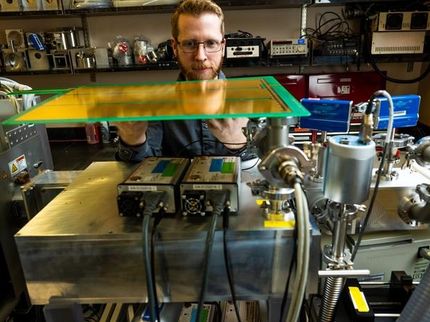Innovative Methods for Biomolecular Mass Spectrometry
Fresenius Award for Kathrin Breuker
The German Chemical Society (GDCh) is awarding Associate Professor Dr. Kathrin Breuker, University of Innsbruck, the Fresenius Award. She will receive the award, which includes a gold medal and prize money of 7,500 euros, for special services to analytical chemistry. With her scientific work, Breuker provides fundamental insights into the properties of biomacromolecules in the gas phase. She will receive the award on March 10 as part of ANAKON 2025 in Leipzig. The GDCh Division of Analytical Chemistry, which is organizing the Conference , and its working groups will also honor scientists on site.

Associate Professor Dr. Kathrin Breuker
privat
Kathrin Breuker receives the Fresenius Award in particular for her achievements in the field of biomolecular mass spectrometry, a method for determining the mass of biomolecules. She developed innovative methods for studying complex molecular systems. These include native protein structures, the folding and unfolding of proteins in the gas phase, and the dissociation (decay) of proteins and nucleic acids (RNA). To do this, Breuker used high-resolution mass spectrometry (FT-ICR-MS, a technique for precise mass determination) and various fragmentation methods that break molecules down into smaller parts. Her work provides fundamental insights into the properties of biomacromolecules in the gas phase.
In addition, Breuker is involved in scientific committees, especially in the German Society for Mass Spectrometry (DGMS), and actively builds international networks. She is the jury chair for the "Mass Spectrometry in the Life Sciences" award and a member of the jury for the DGMS Mattauch-Herzog Prize.
Kathrin Breuker graduated in physics from the University of Münster in 1994. She then moved to the Swiss Federal Institute of Technology in Zurich, Switzerland, where she received her doctorate in 1999. After postdoc stays at Cornell University, Ithaca, USA, and in Innsbruck, Austria, she began working as a research group leader at the University of Innsbruck in 2002. After obtaining her Venia Docendi in Biophysical Chemistry, she worked there as an assistant professor from 2014. Breuker has been an Associate Professor at the Institute of Organic Chemistry at the University of Innsbruck since 2019. Her research has already received several awards and funding.
Other awards ceremonies
As part of ANAKON, the GDCh Division of Analytical Chemistry and two of its working groups also present several awards:
- Professor emeritus Dr. Wolfgang Lindner, University of Vienna, Austria, receives the Clemens-Winkler Medal for his many years of personal and passionate commitment to the promotion and recognition of analytical chemistry as well as to the promotion of young talent.
- The Fresenius Lectureship 2024-2026 goes to Prof. Dr. Johanna Irrgeher, Montanuniversität Leoben, and to Prof. Dr. Kevin Pagel, Freie Universität Berlin. The lecture series, which has been awarded to renowned young university lecturers from German-speaking countries since 2011, is intended to bring current research results from modern analytical chemistry and the fascination for the discipline closer to a broad chemical specialist audience.
- Dr. Anika Retzmann, University of Calgary, Canada, receives the Analytical Chemistry Division Award for her outstanding and independent achievements in the early stages of her scientific Career.
- In addition, the Working Group Separation Science of the Division of Analytical Chemistry is awarding Dr. Thorsten Teutenberg, Institute for Environment & Energy, Technology & Analytics eV (IUTA), Duisburg, the Gerhard-Hesse Award for his outstanding achievements in the field of analytical separation techniques.
- Dr. Andrea Teuber receives the prize of the German Working Group for Analytical Spectroscopy (DAAS) of the GDCh Division of Analytical Chemistry, sponsored by Merck KGaA, for her dissertation in the field of analytical spectroscopy, which she completed at the University of Ulm.
Other news from the department people
Most read news
More news from our other portals
See the theme worlds for related content
Topic World Mass Spectrometry
Mass spectrometry enables us to detect and identify molecules and reveal their structure. Whether in chemistry, biochemistry or forensics - mass spectrometry opens up unexpected insights into the composition of our world. Immerse yourself in the fascinating world of mass spectrometry!

Topic World Mass Spectrometry
Mass spectrometry enables us to detect and identify molecules and reveal their structure. Whether in chemistry, biochemistry or forensics - mass spectrometry opens up unexpected insights into the composition of our world. Immerse yourself in the fascinating world of mass spectrometry!





























































